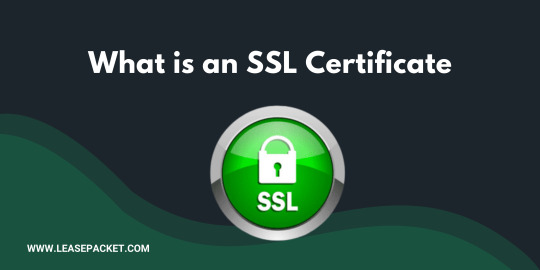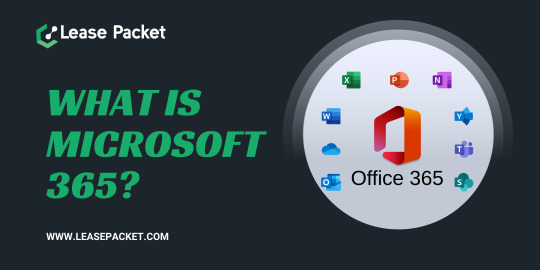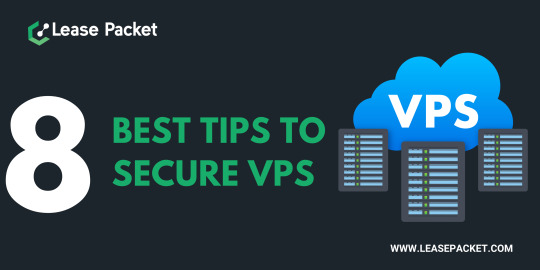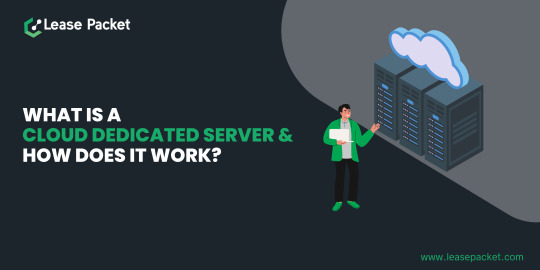Lease Packet provides fast and secure web hosting for your website. We are specialized to provide a unique website hosting experience with high-end technical services and 24*7 assistance:- https://leasepacket.com/
Don't wanna be here? Send us removal request.
Text
What is a DDoS Attack?

One of the most common and disruptive online threats is the DDoS attack. DDoS stands for Distributed Denial of Service. Understanding what this means, how it works, and how to protect against it is necessary for anyone who uses the internet. This blog will explain DDoS attacks in simple terms, covering their definition, how they operate, the damage they can cause, and tips on how to protect against them. So let's get started without any delays.
Understanding DDoS Attacks
A DDoS attack is an attempt to disturb the normal traffic of a targeted server, service, or network by overwhelming it with a flood of internet traffic. The aim is to make the online service unavailable to its intended users. It is done by using multiple compromised computer systems as sources of attack traffic. These can include computers and other networked resources, such as IoT (Internet of Things) devices.
Key Components of a DDoS Attack:
Attackers: The individuals or groups who initiate the DDoS attack.
Botnets: Networks of hijacked devices used to carry out the attack. These devices are often infected with malware.
Target: The server, network, or website that the attackers aim to disrupt.
How Does a DDoS Attack Work?
A DDoS attack is like an unexpected traffic jam clogging up a highway, preventing regular traffic from arriving at its destination. Here’s a step-by-step look at how a DDoS attack is typically carried out:
Compromising Devices: Attackers begin by infecting multiple computers or devices with malware, turning them into a network of bots (also known as a botnet). This is often done through phishing emails, malicious downloads, or exploiting vulnerabilities in software.
Command and Control: The attackers control the botnet remotely through a command and control server. They instruct these bots to send large amounts of data to the target website or server.
Launching the Attack: At a designated time, all the bots in the botnet start sending requests to the target simultaneously. This sudden surge in traffic overwhelms the target’s servers, making it slow down or even crash entirely.
Sustaining the Attack: The attackers can keep the attack going for hours, days, or even longer, depending on their goal and resources.
Types of DDoS Attacks
There are several types of DDoS attacks, each targeting different components of a network connection:
Volume-Based Attacks: These focus on overwhelming the bandwidth of the target site. They include techniques like ICMP floods, UDP floods, and spoofed-packet floods.
Protocol Attacks: These attacks exploit vulnerabilities in the network protocols. Examples include SYN floods, Ping of Death, and fragmented packet attacks.
Application Layer Attacks: These are more sophisticated and target the application layer where web pages are generated on the server and delivered in response to HTTP requests. Examples include HTTP floods, Slowloris, and DNS query floods.
The Impact of DDoS Attacks
DDoS attacks can have severe consequences for businesses and individuals alike. Here are some of the potential impacts:
Downtime: The most immediate effect of a DDoS attack is that it makes the targeted service unavailable. For businesses, this means customers cannot access their website, resulting in lost revenue.
Reputation Damage: Frequent or prolonged downtime can damage a company’s reputation, as customers may lose trust in the reliability of their services.
Financial Costs: Beyond lost sales, businesses may incur significant costs in mitigating the attack, upgrading their security infrastructure, and dealing with potential legal consequences.
Data Breaches: In some cases, DDoS attacks are used as a smokescreen to distract security teams while the attackers infiltrate the network and steal sensitive data.
How to Protect Against DDoS Attacks
Protecting against DDoS attacks requires a multi-faceted approach. Here are some essential tips:
Invest in Robust Security Solutions: Use DDoS protection services that can detect and mitigate attacks before they impact your services. These include solutions from cloud providers and dedicated DDoS mitigation services.
Implement Firewalls and Load Balancers: Firewalls can filter out malicious traffic, while load balancers can distribute traffic across multiple servers, making it harder for an attack to overwhelm your system.
Maintain a Strong Network Architecture: Design your network with redundancy and failover capabilities. Spread out your resources to avoid having a single point of failure.
Monitor Network Traffic: Regularly monitor your network for unusual traffic patterns. Early detection of abnormal traffic can help mitigate the impact of an attack.
Have a Response Plan: Develop and practice an incident response plan so your team knows exactly what to do in the event of a DDoS attack. This includes having contacts at your ISP and DDoS protection service provider.
Conclusion
DDoS attacks are a common threat in today’s internet connected time. They can cause some serious damage to businesses and individuals by making online services unavailable and damaging reputations. Understanding what DDoS attacks are, how they work, and how to protect against them is essential for maintaining online security. By investing in high security measures, maintaining a secure network architecture, and staying active, you can significantly reduce the risk and impact of DDoS attacks.
FAQs
Q1. What is a DDoS attack and how does it work?
A DDoS attack, or Distributed Denial of Service attack, is a malicious attempt to disrupt the normal traffic of a targeted server, service, or network by overwhelming it with a flood of internet traffic. It works by using multiple compromised devices, known as a botnet, to send a massive amount of traffic to the target, causing it to slow down or crash. This makes the service unavailable to its intended users, resulting in downtime and potential financial loss.
Q2. What are the common types of DDoS attacks?
There are several types of DDoS attacks, each targeting different components of a network. Volume-based attacks aim to overwhelm the bandwidth of the target site, including ICMP floods and UDP floods. Protocol attacks exploit weaknesses in network protocols, such as SYN floods and Ping of Death. Application layer attacks target the application layer where web pages are generated, including HTTP floods and DNS query floods. Each type requires different strategies for mitigation and protection.
Q3. How can DDoS attacks impact my business?
DDoS attacks can have severe consequences for businesses. The immediate effect is downtime, which makes the targeted service unavailable and can lead to lost revenue. Repeated or prolonged downtime can damage a company’s reputation, eroding customer trust. Additionally, businesses may face significant financial costs in mitigating the attack, upgrading security infrastructure, and dealing with potential legal issues. In some cases, DDoS attacks are used as a distraction while cybercriminals infiltrate the network to steal sensitive data.
Q4. How can I protect my business from DDoS attacks?
Protecting your business from DDoS attacks involves a multi-faceted approach. Invest in robust security solutions, such as DDoS protection services from cloud providers or dedicated DDoS mitigation services. Implement firewalls and load balancers to filter malicious traffic and distribute traffic across multiple servers. Maintain a strong network architecture with redundancy and failover capabilities to avoid a single point of failure. Regularly monitor network traffic for unusual patterns and develop an incident response plan to swiftly address any attacks. By taking these steps, you can significantly reduce the risk and impact of DDoS attacks on your business.
0 notes
Text
Best Remote Desktop Software for Mac 2024

In this internet-centric world, almost everything is connected to your devices in one way or another. In times like these, a reliable remote connection is a must. Because you never know when you need to connect your device when you are far away. And especially if you are a Mac user, high-performance software is required to handle large files & quality software. Today, many remote desktop software are available for Mac to control your device from anywhere in the world. With this, we aim to find the best remote desktop software for Mac in 2024.
Best Remote Desktop Software for Mac 2024
TeamViewer
TeamViewer has been a favorite among users for its ease of use and robust features. With TeamViewer, you can access your Mac remotely from anywhere with an internet connection. Its cross-platform compatibility allows you to connect to Windows, Linux, and mobile devices effortlessly. Moreover, TeamViewer offers secure remote access with end-to-end encryption to ensure your data remains safe during transmission. Provide remote support, collaborate on projects, or access files on the go - TeamViewer is really one of the best remote desktop software for Mac.
Chrome Remote Desktop
Are you looking for a simple remote desktop solution? Chrome Remote Desktop is worth considering. As an extension for Google Chrome, it smoothly integrates with your browser, making it easy to set up & use. With Chrome Remote Desktop, you can access your Mac from Chrome running on any device - Windows, Linux, and Chrome OS. Also, it offers secure remote access using Google's infrastructure, giving you peace of mind when working remotely.
Remote Desktop Manager
Remote Desktop Manager is a complete solution for managing all your remote connections in one place. Connect to Mac, Windows, Linux, or virtual machines - Remote Desktop Manager has all the desired tools & features. It supports numerous protocols such as RDP, SSH, VNC, and Telnet - making it suitable for IT professionals. With features like credential management, session recording, and multi-monitor support - Remote Desktop Manager offers unparalleled flexibility and control over your remote connections.
AnyDesk
Known for its high-speed performance & low latency, AnyDesk is another popular choice for remote desktop access. With AnyDesk, you can remotely control your Mac from anywhere with minimal lag due to its compression algorithms. Moreover, AnyDesk provides security with TLS 1.2 encryption and RSA 2048 asymmetric key exchange to protect your data from unauthorized access. Working from home or traveling, AnyDesk gives you a smooth remote desktop experience.
Splashtop
Splashtop offers a range of remote desktop solutions tailored to different use cases - personal use, enterprise-level deployments, and high-performance work. With Splashtop, you can access your Mac from any device, including Windows, Mac, iOS, Android, and Chromebook. Its high-performance engine delivers responsive remote access, even over low-bandwidth connections. Splashtop also provides advanced features like file transfer, remote printing, and session recording, making it a versatile choice for remote work.
Microsoft Remote Desktop
Microsoft Remote Desktop is an excellent choice for Mac users who need to connect to Windows-based systems. This software enables remote Windows desktop access from your Mac device. It has a robust interface for customizing your remote desktop experience according to your preferences. Microsoft Remote Desktop supports remote audio and video streaming for multimedia applications and virtual meetings.
RealVNC
RealVNC is one of the best remote desktop software for Mac. It offers both cloud-based and on-premises solutions. With RealVNC, you can securely access your Mac from anywhere using any device. The encryption & authentication mechanisms are unique features of RealVNC. It also supports multi-platform connectivity for connecting Mac, Windows, Linux, and Raspberry Pi devices. RealVNC can provide enterprise-grade features like centralized deployment, user authentication, and audit logging when needed.
Conclusion
Having the right remote desktop software for your Mac is essential if you work from a distance. Security, features, and ease of work - are the factors you should consider in a remote desktop software for Mac. You must ensure that these things align with your requirements. From the above list, you can choose any software. All are the best remote desktop software for Mac in 2024.
0 notes
Text
5+ Reasons To Use Plesk Control Panel

Want to grow your online business but afraid of interrupted website service then use the Plesk control panel for better website and server management. Nowadays, every business has become online. With the help of websites, people are running their businesses. Along with this, securing and management of the website will also become very challenging. In this regard, the Plesk control panel is a good choice. There are numerous reasons to use Plesk.
Plesk is one of the most popular control panels. It is well-known for its flexible user-friendly interaction and rich set of features. With the help of this blog, we have defined several reasons to use Plesk.
What is Plesk
Plesk is all in one web hosting control panel for VPS and dedicated server. Plesk is designed to provide management solutions to servers, applications and websites. It provides server solutions to both linux and windows based servers. User-friendly interface and rich features of Plesk are the few reasons for the popularity of Plesk.
In the next section, we have defined several reasons to use Plesk.
5+ Reasons to use Plesk Control Panel
Here, we are going to provide reasons to use Plesk. These reasons to use Plesk will explain why Plesk is best.
1. Website Development
Plesk control panel helps developers to design a perfect website. In the world of digital businesses, websites play a vital role. A well-designed website defines the success of your business. Plesk control panel helps web developers to create perfectly designed websites that are compatible with every device. Grow your online business with security features, with regular addition of blogs and product description and share your reviews every day. People with some basic knowledge can use this control panel. So, Web development is one of the reasons to use Plesk.
2. Powerful Server and Site Protection
For every online business, website security is a basic concern. Every online business wants to protect their website from cyber attacks. Plesk control panel is especially designed to fulfil all security needs. It ensures protection of operating systems, applications and networks. Security is one of the best reasons to use Plesk.
3. Consolidated Control Panel
Plesk is a centralised control panel. It is designed to manage multiple websites at one time. With the help of this single control panel, users can develop websites, check updates and examine performance. These are the perfect reasons to use Plesk.
4. Allows to design Applications
Plesk comes with features that allow users to design applications. With this, Plesk offers some additional features for website designing such as addition of applications in the website. Design applications in the control panel is one of the good reasons to use Plesk.
5. Launch of Extension Catalogue
Plesk control panel launched an extension catalogue. It consists of 150+ extensions in its catalogue. It helps to boost performance and improve user experience. There are several applications in the extension store. Platforms such as GitHub, WordPress toolkits, Docker and NGINX allow users to choose any extension in just a few clicks.
6. Highly Adaptable with other platforms
Its highly compatible feature makes Plesk the top choice of developers. Plesk is all in one control panel that comes with a user-friendly interface. Plesk is the leading control panel that runs cloud hosting platforms such as Google Cloud, Azure, AWS and many more. This highly compatible feature is one of the reasons to use Plesk.
7. Designed for both Linux and Windows Operating Systems
While Cpanel is designed to support Linux based servers, Plesk control panel is basically designed to support both linux and windows operating systems. With Plesk, users can migrate the website from other control panels. It is one of the most important reasons to use Plesk.
8. Automatic Backup Solution
Plesk control panel offers automatic backup solution for websites and databases. These backup solutions prevent users from sudden outage, data loss and cyber attack. Every developer is looking for a control panel that provides an automatic backup solution. In this regard, the Plesk backup solution is a great match. Backup solution is one of the reason to use Plesk.
9. Ability To Self-Repair
Plesk control panel comes with an automatic self detection tool. These tools automatically detect complex issues and fix them. With Plesk, the system can identify technical errors and solve them without any support. The self repair feature is one of the reasons to use Plesk.
Conclusion
In this blog, we have defined numerous reasons to use Plesk. These reasons show why the Plesk control panel is a better choice than others. The main reason is that Plesk supports linux and windows based systems. Plesk comes with security features such firewall protection, virus scanning, password protection and many more. Overall, it is all in one solution for website and server management.
Visit our website today to get the best deals on the Plesk licence.
FAQs
What is the purpose of Plesk?
Ans Plesk is a control panel used to offer a user-friendly interface and automatic tools to virtual private or dedicated servers.
Why is Plesk better than Cpanel?
Ans. Both are good control panels but Plesk is good for beginners.
How popular is Plesk?
Ans. Plesk popularity percentage is 88.3%
Who owns Plesk?
Ans. British Oakley Capital Limited owns Plesk.
0 notes
Text
What is an SSL certificate?

SSL certificates help keeping important stuff safe on the internet and making sure people can trust websites. As the online world gets bigger, it's really important for website owners, managers, and even people using websites to know what SSL certificates are and how they do their job. In this guide, we'll take a closer look at SSL certificates—what they do, how they work, and why they're so important for keeping our data secure.
Understanding SSL Certificate
SSL, or Secure Socket Layer, is like a secret code for making sure our online conversations stay safe and private. When you visit a website with SSL, it uses a special digital certificate to prove it's really the website it claims to be. Plus, it locks up the information you share—like passwords and credit card numbers—in a secret box, so no one else can listen in or sneak a peek. This way, SSL keeps our sensitive details safe from any unwanted snooping while we're surfing the web.
How SSL Certificates Work:
Authentication:
SSL certificates play a crucial role in authenticating the identity of a website. When a user connects to a website secured with SSL, the SSL certificate verifies that the website is indeed who it claims to be. This authentication process is vital for building trust with users.
Encryption:
Once the identity is verified, SSL certificates initiate a secure session by encrypting the data transmitted between the user's browser and the website's server. This encryption transforms the data into an unreadable format for anyone trying to intercept or manipulate it. The use of public and private keys ensures that only authorized parties can decipher the encrypted information.
Data Integrity:
SSL certificates also ensure data integrity by preventing data tampering during transmission. The cryptographic algorithms used in SSL create a unique fingerprint (hash) for each piece of data. This hash is transmitted along with the data, and the recipient can verify its integrity by comparing it with the calculated hash upon reception.
Types of SSL Certificates
Domain Validated (DV) Certificates:
These certificates verify the domain ownership but do not validate the organization behind the website. They are suitable for basic encryption needs.
Organization Validated (OV) Certificates:
OV certificates provide a higher level of authentication by verifying both domain ownership and the legitimacy of the organization operating the website. They are often used by businesses and organizations.
Extended Validation (EV) Certificates:
EV certificates offer the highest level of validation, involving a thorough vetting process to confirm the legal entity behind the website. Websites with EV certificates display a green address bar in most browsers, signifying a high level of trust.
The Importance of SSL Certificates
Security and Data Protection:
SSL certificates are paramount in protecting sensitive data from potential cyber threats. They create a secure environment for online transactions, login credentials, and any other confidential information exchanged between users and websites.
Trust and Credibility:
Websites with SSL certificates inspire trust among users. The visual cues, such as the padlock icon in the browser's address bar or the "https://" protocol, signal a secure connection, enhancing the credibility of the website.
Search Engine Rankings:
Search engines, like Google, consider SSL as a ranking factor. Websites with SSL certificates may receive a slight boost in search engine rankings, contributing to improved visibility and organic traffic.
Compliance with Regulations:
Many data protection regulations, such as GDPR, require the secure transmission of personal data. Implementing SSL certificates helps websites comply with these regulations and avoid potential legal issues.
Conclusion
An SSL certificate is a fundamental component of modern web security, ensuring the confidentiality, integrity, and authenticity of online communications. Whether you're running an e-commerce site, a personal blog, or a corporate platform, integrating SSL certificates is a proactive step towards creating a secure and trustworthy online environment. Stay informed, prioritize security, and empower your website with the robust protection afforded by SSL certificates.
0 notes
Text

What Is Microsoft 365?
In the world of technology that's always changing, Microsoft 365 is like a powerful toolbox that has changed the way people and businesses do things. It used to be called Office 365, and now it includes many different tools to help with work. This blog will look closely at Microsoft 365, talking about what's inside, what it can do, and how it's making work easier for people today.
Understanding Microsoft 365
Microsoft 365 is a service you pay for regularly, and it includes well-known programs like Microsoft Office. But what makes it special is that it also has strong online services. This mix gives you tools to get things done, top-notch security, and the ability to work together with others. Plus, you can access it from almost anywhere if you have an internet connection.
Components of Microsoft 365
Office Applications
Microsoft 365 includes the latest versions of essential Office applications such as Word, Excel, PowerPoint, and Outlook. These applications have evolved to embrace cloud functionality, enabling seamless collaboration and real-time editing.
Cloud Services:
OneDrive for Business provides secure cloud storage, allowing users to access their files from any device and share documents with colleagues effortlessly.
SharePoint Online facilitates team collaboration, offering a centralized platform for document sharing, project management, and communication.
Communication and Collaboration:
Microsoft Teams, a central hub for teamwork, integrates chat, video conferencing, file sharing, and application integration, fostering efficient collaboration among team members.
Outlook, with its advanced email capabilities, integrates seamlessly with Microsoft Teams, providing a comprehensive solution for communication.
Security and Compliance:
Advanced Threat Protection safeguards against sophisticated cyber threats, ensuring the security of emails, files, and collaboration within the Microsoft 365 environment.
Compliance features assist organizations in meeting regulatory requirements, managing data governance, and mitigating legal risks.
Business Intelligence:
Power BI, an advanced business analytics tool, allows users to visualize and share insights from their data, empowering informed decision-making.
Productivity Insights:
MyAnalytics provides individuals and organizations with insights into work habits, helping enhance productivity and work-life balance.
Benefits of Microsoft 365
Flexibility and Accessibility:
With Microsoft 365, users can work from anywhere, accessing their files and applications on a range of devices.
Real-Time Collaboration:
The cloud-based nature of Microsoft 365 fosters real-time collaboration, allowing multiple users to edit documents simultaneously and track changes effortlessly.
Enhanced Security:
Microsoft 365 offers robust security features, protecting against threats and ensuring the confidentiality and integrity of data.
Scalability:
Suited for both small businesses and large enterprises, Microsoft 365 offers scalable solutions that can adapt to evolving organizational needs.
Automatic Updates:
Subscribers benefit from automatic updates, ensuring they always have access to the latest features and security patches.
How to Get Started with Microsoft 365
Subscription Plans:
Choose the Microsoft 365 subscription plan that aligns with your organizational requirements, considering factors such as the number of users, desired applications, and storage needs.
Installation and Setup:
Follow the straightforward installation and setup process, which usually involves creating user accounts, configuring security settings, and installing the necessary applications.
Training and Adoption:
To maximize the benefits of Microsoft 365, invest in training programs for users, ensuring they are proficient in utilizing the diverse features offered by the suite.
Conclusion
Microsoft 365 has truly changed how people and businesses think about getting work done, working together, and staying safe online. By smoothly putting together important programs with online services, Microsoft has made a flexible and active platform that adjusts to how today's workplaces change. As businesses keep moving toward using more digital tools, Microsoft 365 becomes a key part, helping users do more and collaborate well in our always-connected world.
#webhostingcompany#webhostingprovider#hosting#webhosting#hostingweb#hostingprovider#leasepacket#hostingservices#webhostingservices#dedicatedserverhosting#microsoft 365
0 notes
Text

8 Best Tips to Secure VPS
More and more businesses are doing their work on the internet. Many small and medium-sized businesses (SMBs) begin their journey on the internet by using something called a virtual private server (VPS). Whether they take care of it themselves or hire someone to help, keeping this VPS secure is very important for the success of any business.
Companies that provide space on the internet, called web hosting providers, offer different ways to manage these VPS setups. Some are taken care of by the provider, and some need the users to do it themselves. If the provider takes care of it, they make sure it's safe by fixing any problems and setting up the server in a secure way. But if users have more control (something called root access), they can do some or all of these safety measures on their own.
No matter if someone is really good at this computer stuff or just starting to learn, it's important to know how to keep their VPS safe. This article will give you eight tips to make your VPS more secure.
What is VPS?
A VPS, which stands for Virtual Private Server, is like having your own special space on the internet. It's not an entire computer, but it's a part of one that you can use just for yourself. People and businesses use VPS to put their websites, apps, or other things on the internet. It's like having your own little corner on the web where you can do your own things without sharing with others.
Best Tips to Secure VPS
Keep Everything Updated
Imagine your VPS is like a garden, and updates are the water and sunlight it needs to thrive. Regularly updating your server's operating system, software, and applications is the first line of defense against potential security vulnerabilities. Most updates come with security patches that help fix known issues, keeping your VPS strong and resilient.
Set Strong Passwords
Think of your VPS password as the key to your castle. Creating a strong and unique password is essential. Combine uppercase and lowercase letters, numbers, and special characters to make it complex and harder for others to guess. Avoid using easily guessable information like birthdays or common words. Changing your password periodically adds an extra layer of security.
Enable Firewall Protection
A firewall acts like a shield, monitoring and controlling the incoming and outgoing network traffic on your VPS. Configure your firewall to allow only the necessary connections and block anything suspicious. This helps safeguard your VPS from unauthorized access and potential cyber threats.
Install and Configure Fail2Ban
Fail2Ban is like a vigilant guard at your VPS's gate. It automatically detects and responds to multiple failed login attempts, protecting your server from brute-force attacks. By temporarily banning IP addresses that show suspicious behavior, Fail2Ban adds an extra layer of security to your VPS.
Regular Backups are Your Safety Net
Imagine having a safety net below your tightrope – that's what regular backups are for your VPS. In case something goes wrong, like a system failure or a security breach, having recent backups ensures you can quickly restore your data and configurations. Set up automatic backups and store them in a secure, remote location.
Use SSH Key Authentication
Secure Shell (SSH) key authentication is like having a unique fingerprint for accessing your VPS. Instead of relying solely on passwords, SSH keys add an extra layer of security. Even if someone manages to crack your password, they would still need the SSH key to gain access.
Monitor Server Logs
Server logs are like a diary for your VPS, documenting all activities. Regularly reviewing these logs helps you detect any unusual behavior or potential security threats. Monitoring your logs allows you to take proactive measures and respond swiftly to any security incidents.
Regular Security Audits
Conducting regular security audits is like giving your VPS a health check. Scan for vulnerabilities, review access controls, and ensure that your security measures are up-to-date. This proactive approach helps you stay ahead of potential risks and fortify your VPS against emerging threats.
Conclusion
Securing your VPS doesn't have to be complicated. By implementing these eight easy tips – keeping everything updated, setting strong passwords, enabling firewall protection, installing Fail2Ban, regular backups, SSH key authentication, monitoring server logs, and conducting security audits – you can create a robust defense system for your virtual space. Remember, a well-protected VPS ensures a safer and more resilient online presence, allowing you to navigate the digital landscape with confidence.
#webhostingcompany#webhostingservices#webhostingprovider#hosting#hostingprovider#hostingweb#dedicatedserverhosting#leasepacket#webhosting#hostingservices
0 notes
Text

Cloud Server vs Dedicated Server: Comparing the Differences
When we want to show our website or web app to people on the internet, we need something called a server. A server is like a computer that helps our website be seen by others online. There are different types of servers on the internet, and they give us the space and tools we need to share our website.
There are two main kinds of servers: traditional and cloud. Not many people use traditional servers nowadays because cloud servers are more popular. But some big companies still use a kind of traditional server called a dedicated server.
Since the internet started, it has grown a lot, and every year there are new technologies connected to it. People have noticed that when a business is on the internet, it can reach more people and be more successful. So, if you're thinking about putting your business online in 2020 and words like cloud and dedicated servers confuse you, we're here to explain and compare these two terms briefly.
Understanding Cloud Servers
Cloud Servers operate in a virtualized environment, drawing computing resources from a network of interconnected servers. These resources are scalable and can be adjusted dynamically, allowing for flexibility in managing workloads.
Key Features:
Scalability: Cloud Servers offer the ability to scale resources up or down based on demand. This ensures optimal performance during peak times and cost savings during periods of low activity.
Resource Pooling: Resources like CPU, RAM, and storage are pooled from multiple servers, enhancing reliability and reducing the risk of downtime.
Pay-as-You-Go Model: Users typically pay for the resources they consume, making it a cost-effective solution for varying workloads.
Redundancy: Cloud environments often include redundancy measures, ensuring high availability and minimizing the impact of hardware failures.
What are Dedicated Servers?
Dedicated Servers, on the other hand, are physical servers entirely devoted to a single user or organization. Unlike Cloud Servers, they do not share resources with other users.
Key Features:
Exclusive Resources: Dedicated Servers provide exclusive access to all computing resources, offering consistent performance without resource sharing.
Full Control: Users have complete control over the server's configuration, allowing for customization based on specific requirements.
Predictable Performance: Since resources are not shared, Dedicated Servers offer predictable and stable performance, making them ideal for resource-intensive applications.
Enhanced Security: The isolation of a Dedicated Server enhances security by reducing the risk associated with sharing resources in a multi-tenant environment.
Direct Comparison: Cloud server vs Dedicated server
Cost Factor
Dedicated: With a dedicated server, you have to pay for a specific amount of space. It needs experts and a lot of resources to take care of the server, and that can be really expensive. Small businesses might find it hard to afford a dedicated server. If you decide to use one, you'll need a team specifically to handle and take care of the server.
Cloud: This is the most money-saving service. You only pay for the space and resources you use. The provider takes care of all the expert stuff about how the server works. You don't need anything special to manage the server.
Management:
Dedicated: With a dedicated server, the owner can fully control and manage the server as they need. However, taking care of the server's maintenance and management requires knowing a lot about the server itself. In this case, the owner has complete control of the server.
Cloud: The cloud server is taken care of by someone else; the customer doesn't have control over it. Taking care of a cloud server is more challenging than managing a dedicated server. Unlike one single dedicated server, with a cloud server, we handle lots of virtual servers.
Reliable:
Dedicated: With a dedicated server, we work with just one server. If something goes wrong with that server, it can make the whole server and data stop working, bringing everything down.
Cloud: In the cloud, many servers keep copies of your web page. So, if one server has a problem or stops working, another server takes care of your web page. Having lots of servers makes cloud computing more dependable.
Security:
Dedicated: The main reason people use a dedicated server is for safety. It's very tough for a hacker to break into a dedicated server because the security is strong.
Cloud: Cloud servers also have security, but if you compare it directly with a dedicated server, it's not as strong. It doesn't mean cloud servers are easy to attack—they are still very secure, just not as much as dedicated servers.
Customization:
Dedicated: With a dedicated server, the customer has full control. This means they can change and set up the server as they want.
Cloud: Cloud servers don't give as much control to the customer, so they can't customize the server much.
Integration of Tools:
Dedicated: If you want to connect the dedicated server with some tools, it might cost more compared to a cloud server.
Cloud: Cloud servers provide you with many tools at a lower cost.
Scalability:
Dedicated: You can't easily change the setup in a dedicated server because it uses specific hardware.
Cloud: Cloud servers are flexible. You can change things like resources and space based on what you need.
Wrapping Up
In choosing between Cloud Servers and Dedicated Servers, it's essential to weigh the specific needs of your project or business. Cloud Servers offer flexibility and cost-effectiveness for dynamic workloads, while Dedicated Servers provide unparalleled performance and control for resource-intensive applications. Understanding these differences empowers you to make an informed decision based on your unique hosting requirements, ensuring a solid foundation for your online endeavors.
#webhostingcompany#webhostingservices#webhostingprovider#webhosting#hosting#dedicatedserverhosting#hostingprovider#dedicated server#dedicated hosting#leasepacket#cloudserver
0 notes
Text

How to Buy Cheap Dedicated Server
These days, people browse the web for almost everything and try to get the best possible price. Same is with dedicated servers. Securing a dedicated server with best performance within budget constraints is a common goal for everyone. And we are here to help you with that. This blog will teach you how to buy a cheap dedicated server without compromising on quality. Let's get started.
What Is A Dedicated Server?
A dedicated server is a powerful server solution offered by Lease Packet. It's not shared with anyone else—it's just for you, your group, or your computer program. This kind of server is set up, taken care of, and looked after by a company that provides hosting, cloud, or managed services. So, it's like having a private space in the digital world just for your stuff, and no one else gets to use it.
Steps To Buy Cheap Dedicated server
Assessing Your Requirements
Define Your Needs:
Begin by identifying your specific hosting requirements. Consider factors such as processing power, RAM, storage capacity, and bandwidth. Understanding your needs will help you make informed decisions when selecting a server.
Traffic Estimation:
Evaluate your expected website traffic. If you anticipate high traffic volumes, it's crucial to choose a dedicated server that can handle the load without compromising performance.
Technical Specifications:
Determine the technical specifications required for your applications or websites. This includes the type of processor, amount of RAM, storage type (HDD or SSD), and any additional features needed for your specific use case.
Researching Dedicated Server Providers
Comparison Shopping:
Conduct thorough research on dedicated server providers. Compare prices, features, and customer reviews. Look for providers that offer transparent pricing and a good reputation for reliability and customer support.
Check for Promotions and Discounts:
Many hosting providers offer promotions or discounts for new customers. Keep an eye out for special deals or coupon codes that can significantly reduce the initial cost of a dedicated server.
Customer Reviews:
Read customer reviews and testimonials to gauge the satisfaction of current users. Pay attention to feedback regarding server performance, uptime, and the quality of customer support.
Ask for Recommendations:
Seek recommendations from peers, colleagues, or online communities. Personal recommendations can provide valuable insights into the reliability and performance of different hosting providers.
Budget-Friendly Tips
Optimize Server Configuration:
Fine-tune your server configuration to match your specific needs. Avoid overprovisioning resources that you won't use, as this can lead to unnecessary costs.
Consider Refurbished Servers:
Some hosting providers offer refurbished or "pre-owned" dedicated servers at a lower cost. These servers are thoroughly tested and can provide a cost-effective solution for budget-conscious buyers.
Long-Term Commitments:
Many providers offer discounts for customers willing to commit to longer-term contracts. While this involves a larger upfront payment, it can result in substantial savings over the life of the hosting agreement.
Hidden Costs and Fine Print
Read the Terms of Service:
Carefully read the terms of service, especially focusing on any hidden fees or charges. Some providers may offer low initial prices but have additional costs for services like data transfer, setup fees, or technical support.
Cancellation Policies:
Understand the cancellation policies of the hosting provider. Some may charge fees for early termination or have specific conditions for refunds.
Technical Support and Reliability
24/7 Support:
Ensure that the hosting provider offers 24/7 customer support. This is crucial in case of technical issues or emergencies that may arise at any time.
Uptime Guarantee:
Look for providers with a high uptime guarantee. A reliable hosting provider should ensure that your server remains accessible to users without frequent downtime.
Conclusion
Finding a cheap dedicated server requires a careful balance between cost and performance. By assessing your specific needs, researching providers, and considering budget-friendly tips, you can navigate the market effectively. Remember to read the fine print, prioritize reliable customer support, and make an informed decision based on your unique hosting requirements. With the right approach, acquiring a cost-effective dedicated server that meets your needs is well within reach.
#webhostingcompany#webhostingservices#webhostingprovider#hosting#leasepacket#hostingweb#webhosting#hostingprovider#business#hostingservices
0 notes
Text

In today's evolving business landscape, managing data efficiently is crucial. With our top-tier solutions, experience seamless data storage without compromising on security or efficiency.
What makes us stand out?
Advanced security protocols ensuring your data's safety
Scalable storage options tailored to your business
Easy accessibility for increased productivity
Expert support for a stress-free experience
Join us as we redefine data storage solutions! #StorageSolutions#DataManagement#ServerServices#DigitalTransformation#DataSecurity#InnovativeTech#LeasePacketAdvantage#Leasepacket#Datacenter#Server#DedicatedServer#ServerSolutions
0 notes
Text

Lease Packet's Application Server Solutions
Greetings Lease Packet community! We are excited to tell you more about one of our standout services – Application Server Solutions. At Lease Packet, we understand the role an efficient application server plays in today's digital landscape. Our Application Server Solutions are designed to take your business to new heights. It will ensure seamless performance, reliability, and the freedom to focus on what you do best.
Why Choose Lease Packet's Application Server Solutions?
You may be wondering what makes Lease Packet the best application server provider? Well, we will tell exactly that:
Lease Packet’s Servers are Customized For You:
We understand that each business has its unique requirements. Our Application Server Solutions are designed to meet the specific needs of your applications, providing a customized server environment for optimal performance.
Lease Packet’s Server Offers Unmatched Performance:
Our state-of-the-art servers are equipped with cutting-edge technology to deliver unmatched performance. Say goodbye to lag and downtime, and hello to swift and responsive applications that keep your business running smoothly.
Lease Packet’s Application Server come with 24/7 Monitoring and Support:
Rest easy knowing that your applications are under the scanner of our dedicated support team. With 24/7 monitoring and support, we address any issues, ensuring minimal disruption to your operations.
Scalability for Growth:
As your business grows, so do your server needs. Lease Packet's Application Server Solutions are designed for scalability, allowing you to effortlessly scale up resources to accommodate increased demand and expansion.
Enhanced Security Measures:
Security is important in the digital world. Our Application Server Solutions include robust security measures such as firewalls, regular security audits, and SSL certificates, ensuring the confidentiality and integrity of your data.
Application Server Features:
Dedicated Resources: Enjoy exclusive server resources for your applications, ensuring consistent and reliable performance.
Flexibility and Control: Benefit from a high level of customization and control over your server environment, allowing you to tailor it to your application's unique requirements.
Seamless Integration: Our Application Server Solutions seamlessly integrate with a variety of applications, providing a hassle-free server experience.
How to Get Started
Contact Us:
Reach out to our team to discuss your application server needs. We'll work with you to understand your requirements and recommend the best solution for your business.
Customized Solution:
Receive a personalized server solution tailored to the needs of your applications. Our experts will ensure that your server environment aligns perfectly with your business goals.
Experience the Difference:
Once set up, experience the difference in performance, reliability, and support. Focus on growing your business while we take care of the technical aspects of the application server.
Lease Packet is more than a server provider; we are your dedicated partner in achieving digital success. Choose Lease Packet's Application Server Solutions and elevate your business to new heights. Contact us today to get started on a server journey tailored for your success.
0 notes
Text

Servers do a lot behind the scenes. They store and send information across the internet, kind of like a mailman for data! Here are the basics:
Requests and Replies: When you click a link or search for something, servers fetch the info and send it back to you.
Storage and Handling: They store lots of files and do tasks when asked, just like a super-fast computer.
Keeping Things Safe: Servers make sure your data stays secure and they get regular check-ups to stay in top shape.
#Leasepacket#Datacenter#Server#DedicatedServer#ServerSolutions
#serverwork#Serversupport
0 notes
Text

🌟 Delighted to share the innovative services of "leasepacket"! 🚀 Embrace seamless streaming server solutions tailored for your business needs. 🌐 Our cutting-edge technology ensures top-notch performance, reliability, and scalability. Join the revolution in streaming services! 💡📈 👉 Streamlined content delivery 👉 Enhanced scalability and flexibility 👉 Reliable and secure data transmission Elevate your streaming experience with "leasepacket"! 🌐💼
leasepacket #StreamingServices #TechInnovation #DataStreaming #BusinessSolutions #ServerSolutions #InnovativeTech #FutureReady #StreamlinedPerformance #serversolutions
0 notes
Text

Ever wondered how the internet works behind the scenes? Let's chat about servers!
Hey folks! Let's take a peek into the tech world's unsung heroes: servers! They're like digital powerhouses making sure our online lives run smoothly. Here's a quick rundown:
Servers: They store, process, and deliver data across the web.
They're the reason websites load fast, apps work like a charm, and emails find their way to you in a flash.
Different types cater to various needs - think web servers, database servers, and cloud servers.
Understanding servers is key to navigating the online world. What do you think about these tech superheroes? Let's talk about it! Share your thoughts!
#leasepacket #datacenter #server #DedicatedServer #serversolutions#Technology #Servers #DigitalWorld #TechTalk #Internet #Innovation #DataProcessing
1 note
·
View note
Text

Are server problems causing you frustration, and your current provider not solving or listening to your concerns? Worry not! Migrate to Lease Packet, your reliable server provider ready to assist you 24/7. We understand the importance of your server's smooth operation, and we're here to actively address and resolve any issues you are having. Your peace of mind and security is our top most priority. Contact Lease Packet for servers with dedicated support that listens and there for you 24/7.
0 notes
Text

🌐 Hello everyone! Looking to streamline your online infrastructure effortlessly? 🚀 Our stellar server provider services are designed just for that! Discover solutions that elevate your business operations effortlessly. 💼💻
💡 What sets us apart?
Tailored server solutions meeting your unique requirements
Stringent security measures ensuring data integrity
Scalability for seamless expansion
Budget-friendly services without compromising quality
Let's collaborate to enhance your online presence with efficiency and reliability! Join us! ☁️✨
#ServerProvider #CloudServices #WebHosting #DataSecurity #Scalability #OnlineInfrastructure #TechSolutions #ITConsulting #BusinessEnhancement #LinkedInMarketing #LeasePacket #MalaysiaExpansion #InnovativeGrowth #datacenter #server #DedicatedServer #serversolutions
0 notes
Text

Exciting News: Lease Packet Expands Global Reach to Malaysia! We're thrilled to announce a significant milestone in our journey! Lease Packet has extended its global footprint with the launch of dedicated servers right in the heart of Malaysia! Our commitment to providing top-notch hosting solutions takes a giant leap forward as we bring our dedicated servers closer to businesses in the dynamic Malaysian landscape. This strategic move not only enhances our global network but also ensures businesses in Malaysia experience unmatched performance, reliability, and lightning-fast connectivity.Why Malaysia, you ask? Because we believe in catering to the diverse needs of businesses worldwide, and Malaysia's booming tech scene is the perfect hub for innovation and growth. With this expansion, we're not just offering servers; we're delivering a seamless digital experience that empowers businesses to thrive in the digital era.Our dedicated servers in Malaysia bring a world of possibilities, from enhanced data security to improved website performance. It's not just about servers; it's about elevating your digital journey.
#LeasePacketGlobal#MalaysiaExpansion#InnovativeGrowth#GlobalBusiness#NewMarkets#BusinessInnovation#InnovativeSolutions#ExpandingHorizons#InnovationLeadership#GlobalOpportunities
0 notes
Text
Lease Packet Launches Honolulu Dedicated Server
In an exciting development for server enthusiasts and businesses alike, Lease Packet has recently expanded its offerings with the launch of Honolulu dedicated server. This strategic move not only caters to the growing demand for high-performance server solutions but also opens up new possibilities for businesses and website owners looking for a reliable and robust server environment.
Why Honolulu?
Honolulu, with its unique geographical location and status as a hub for business and technology in the Pacific, emerges as an ideal choice for Lease Packet's dedicated server launch. The city's strategic positioning not only ensures low-latency access for the Asia-Pacific region but also offers enhanced connectivity to North America. This move reflects Lease Packet's commitment to providing optimal service to a diverse and global clientele.
Key Features of Lease Packet's Honolulu Dedicated Server
Cutting-Edge Performance:
Lease Packet's dedicated servers in Honolulu are equipped with state-of-the-art hardware, ensuring blazing-fast performance for demanding applications and high-traffic websites.
Low Latency for Asia-Pacific Users:
The strategic location of these servers significantly reduces latency for users in the Asia-Pacific region, providing a seamless and responsive online experience.
Reliability and Uptime:
Lease Packet is well-known for its commitment to reliability. The new dedicated servers in Honolulu are backed by robust infrastructure, redundant systems, and proactive monitoring to ensure maximum uptime.
Enhanced Security Measures:
Security is a top priority for Lease Packet. The dedicated servers are equipped with advanced security protocols, firewalls, and regular updates to safeguard against potential threats.
Scalability for Growing Businesses:
As businesses expand, so do their server requirements increase. Lease Packet's dedicated servers offer scalability, allowing businesses to scale their resources seamlessly as their requirements evolve.
24/7 Technical Support:
Lease Packet continues its tradition of providing exceptional customer service. The dedicated servers in Honolulu come with 24/7 technical support, ensuring that assistance is readily available whenever needed.
Benefits for Businesses and Website Owners
Faster Load Times:
With servers located in Honolulu, businesses targeting the Pacific region can enjoy faster load times, reducing bounce rates and improving overall user satisfaction.
Global Reach:
The new servers enhance Lease Packet's global reach, making it an attractive choice for businesses looking to cater to an international audience.
Optimized Performance for Hawaii-Based Businesses:
Local businesses in Hawaii can benefit from Lease Packet's dedicated servers, experiencing improved website performance and reliability.
Conclusion
Lease Packet's launch of Honolulu Dedicated Server marks a significant step forward in the world of web servers. The strategic placement of servers, coupled with Lease Packet's commitment to performance, security, and scalability, positions this offering as a compelling choice for businesses and website owners seeking top-notch server solutions. As the digital landscape continues to evolve, Lease Packet's dedication to providing cutting-edge solutions ensures that clients can confidently navigate the online realm with enhanced speed, reliability, and support.
FAQs
Can local businesses in Hawaii benefit from Lease Packet's Honolulu Dedicated Server?
Absolutely. Local businesses in Hawaii can experience improved website performance and reliability, making Lease Packet's Honolulu dedicated server an optimal choice for businesses based in the region.
Why did Lease Packet choose to launch Honolulu Dedicated Server?
Honolulu was chosen strategically due to its central location in the Pacific, providing low-latency access to both the Asia-Pacific region and North America. This ensures optimal connectivity for a diverse clientele.
0 notes